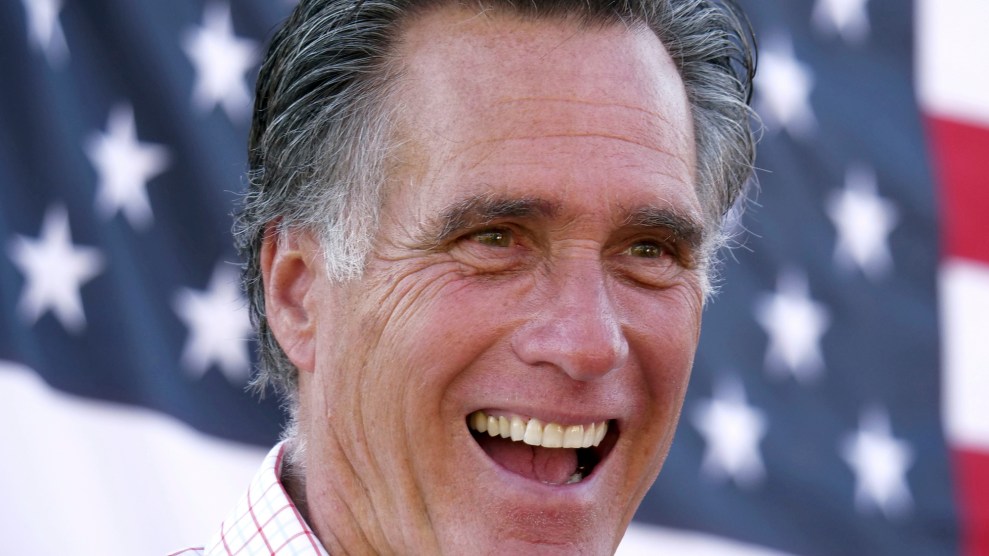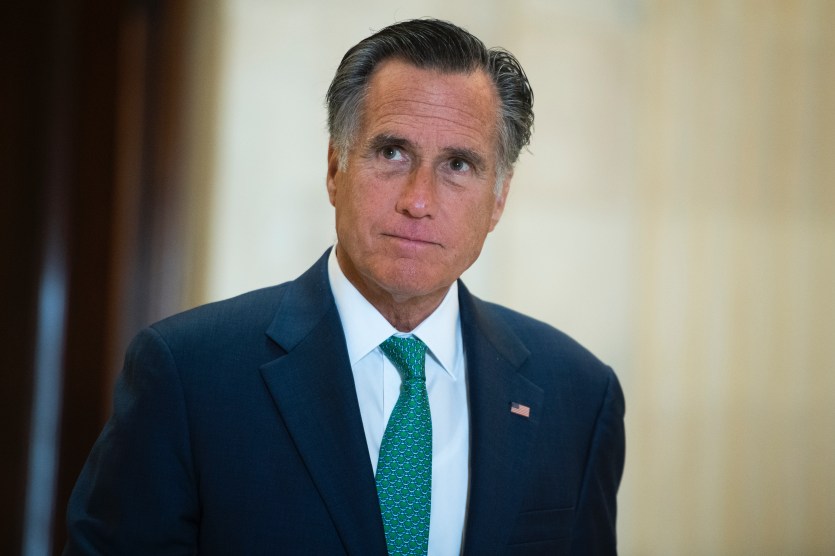
Sen. Mitt Romney (R-Utah)Rick Bowmer/AP Photo
When Sen. Mitt Romney replaced Sen. Orrin Hatch (R-Utah) in 2018, he was continuing a long tradition of relatively moderate Republican senators from Utah who were able to cross the aisle and get things done. (Utah hasn’t elected a Democrat to the Senate since 1970.) That tradition is likely to end with him. Now that Romney has announced that he’s not running for reelection, the Utah GOP primary free-for-all is officially underway, with the full craziness of the party’s rightward shift already on display.
After Hatch retired, 12 candidates jumped in to fill the Senate seat that Romney ultimately won by a large margin. Now, virtually every member of the Utah House delegation, along with Lt. Gov Deidre Henderson, seems to be mulling a campaign to replace Romney. Utah House Speaker Brad Wilson created an exploratory committee for the seat in July, and Riverton Mayor Trent Staggs declared his candidacy in May.
In an early indication of where the race is headed, Staggs is holding a fundraiser Monday that will be headlined by Kari Lake, the failed Senate candidate from Arizona who tried to overturn both her own election loss and promoted the lie that former President Donald Trump won the 2020 election. First reported by Bryan Schott at the Salt Lake Tribune, Lake’s planned appearance was fortuitous, coming on the heels of Romney’s retirement news. Her presence will help cement Staggs’ populist bona fides early in a race that promises to be full of candidates trying to out-MAGA each other now that they no longer have Romney to beat up on.

Also reportedly considering a run for the seat is Tim Ballard, a Mormon former Homeland Security agent and founder of an anti-human trafficking organization whose work inspired the sleeper hit movie Sound of Freedom, which has been popular with the QAnon crowd. Ballard’s campaign to replace Romney, however, may have some trouble getting off the ground. This week, the LDS church officially rebuked him after Vice reported that he had misrepresented his relationship with M. Russell Ballard, the acting president of the faith’s Quorum of the Twelve Apostles, to help his business ventures—the church called this “morally unacceptable.” Ballard is not related to the LDS church official.
Utah House Speaker Wilson comes to the race with low numbers—a July poll found him winning the support of just 7 percent of voters in a Senate race without Romney—but he has by far the best fundraising record. Wilson already has more than $2 million in his campaign chest, of which about half came from his own pocket. He has been positioning himself as Romney’s heir apparent, taking the lead on efforts to save the dying Great Salt Lake, a popular cause.
But even Wilson has worked to demonstrate his loyalty to Trump. Shortly after Romney voted to impeach the former president the first time, in February 2020, Wilson filed a resolution in the state legislature to “pay tribute” to Trump. The legislature ultimately issued a citation expressing “appreciation and gratitude” for all Trump had done to fuel Utah’s economy, and for scaling back the Bears Ears National Monument that President Barack Obama established in Utah. Weirdly, the citation was probably the moderate compromise, a sop to head off the legislature’s “yellow cake caucus” of rural, MAGA legislators and their calls to censure Romney for his impeachment vote.
The Utah GOP, like many state Republican parties, has moved to the right over the past decade, starting with the tea party movement. That shift helped Utah’s other senator, Mike Lee, oust a moderate Republican in an upset at the party’s 2010 convention. The Utah Legislature later passed a law that lets candidates bypass their party nominating convention and instead use signatures to win a spot on the primary ballot—a change that helped the moderate Romney get elected. But far-right Republicans have increasingly taken over state party posts. In 2021, both Romney and Spencer Cox, Utah’s popular Republican governor, were booed by delegates to the state GOP convention. That same year, the state party elected to its leadership a woman who’d been on the US Capitol grounds during the January 6 insurrection.
Romney is the rare candidate who probably could have transcended these trends in 2024—his approval numbers have been on the upswing this year—and Utah Democrats may well have switched parties (again) to vote for him in the GOP primary in the hope of heading off a more radical candidate. Anyone else will have to thread the needle as Wilson did during Trump’s impeachment, trying to mollify Utah’s vocal MAGA base while still appealing to the state’s traditionally more moderate voters. Given the difficulties of that task, it’s not too hard to see why Romney decided to quit while he was ahead.
















